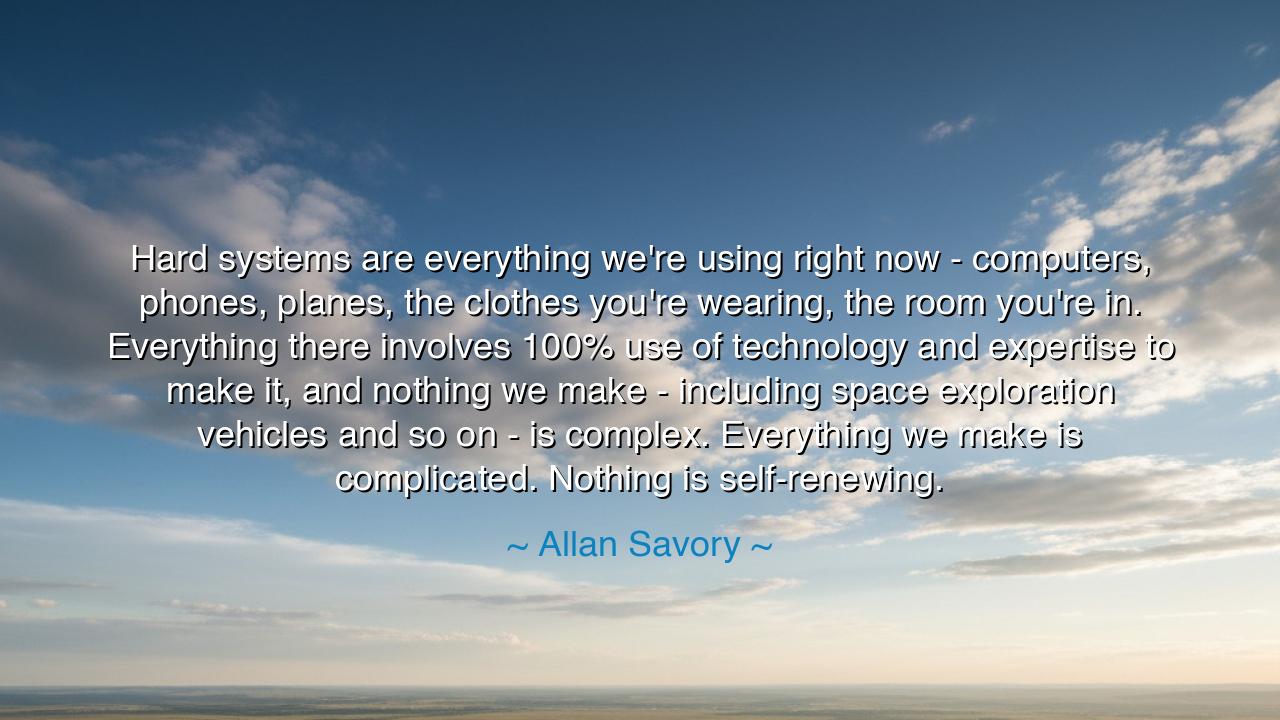
Hard systems are everything we're using right now - computers
Hard systems are everything we're using right now - computers, phones, planes, the clothes you're wearing, the room you're in. Everything there involves 100% use of technology and expertise to make it, and nothing we make - including space exploration vehicles and so on - is complex. Everything we make is complicated. Nothing is self-renewing.






"Hard systems are everything we're using right now - computers, phones, planes, the clothes you're wearing, the room you're in. Everything there involves 100% use of technology and expertise to make it, and nothing we make - including space exploration vehicles and so on - is complex. Everything we make is complicated. Nothing is self-renewing." These words by Allan Savory cut to the heart of the relationship between humanity and the tools we create. They speak to the complicated nature of our modern world—how the systems we rely on daily, from the smallest gadget to the most grandiose technological achievements, are deeply interconnected and entirely dependent on human expertise and technology. And yet, Savory challenges us with a powerful truth: these creations, no matter how advanced, are not self-renewing; they are fragile and require constant human intervention to maintain.
In the ancient world, the Greeks were acutely aware of the difference between the natural world, which was self-renewing, and the artificial systems that humans created. Aristotle spoke of the importance of understanding the natural order, of the intricate balance between the Earth’s creatures, plants, and elements, each of which was designed to sustain itself. He saw humans as stewards of nature, with the responsibility to ensure the flourishing of life. Savory’s words, however, remind us that our modern creations—whether computers, clothing, or transportation systems—lack this self-sustaining quality. They are complicated but not complex, requiring human care and attention to function, and without this, they fail.
Consider the story of Rome, a civilization that built impressive infrastructures: aqueducts, roads, and monumental structures that stood as symbols of human ingenuity. But the fall of Rome came not because their creations were too simple, but because they relied too heavily on maintaining these systems without understanding the natural limitations they faced. The empire’s reliance on external sources of labor, goods, and natural resources without reinvesting in the health of the land or their own people’s capacity for renewal led to their downfall. Rome’s systems, as grand as they were, were complicated, not self-sustaining, and thus, when the natural flow of resources was disrupted, the empire collapsed.
Savory’s statement is a warning: all the things we make today—be they smartphones, planes, or space exploration vehicles—are dependent on resources that are finite and systems that require constant intervention. These creations may seem complex, but they are, at their core, fragile constructions, vulnerable to disruption. When we look at our technological advances, we must ask ourselves: have we created systems that respect the natural cycles of life, or have we simply built towers of sand, complicated but unstable, requiring ever more energy, more resources, and more human effort to keep them from falling apart?
One might think of space exploration as the pinnacle of human achievement—an endeavor that pushes the boundaries of what is possible. Yet, Savory’s words remind us that even in space, the tools we use are merely complicated systems built on technological foundations. The spacecrafts that journey into the cosmos are not self-sustaining; they rely on a tightly controlled environment, constant input of resources, and human ingenuity. And just as these systems rely on external forces to survive, so too does the entire technological world we’ve built. Nothing, in Savory's view, is truly self-renewing.
Savory’s words point us to a deeper truth about our relationship with nature. In our pursuit of progress, we have often created systems that extract from the Earth, rather than renew it. The modern world, in all its complexity, has grown disconnected from the natural cycles that sustain life. Nature renews itself effortlessly, through processes like photosynthesis, the water cycle, and the growth of ecosystems. But our creations, built from the same materials that nature provides, are unsustainable without constant human oversight and intervention. This is the paradox: we have created complicated systems that do not reflect the harmony of the natural world.
The lesson Savory offers us is a call to reflection. As we move forward into an age of ever-expanding technology, we must ask ourselves: are we simply building more complicated systems, or are we building systems that reflect the wisdom of the Earth itself? The challenge for us, as stewards of this world, is to find ways to create technology that is not only innovative but also sustainable, to seek renewal in our creations, rather than dependence. Just as the ancient philosophers taught us to understand and live in harmony with nature, so too must we understand that the true measure of our progress lies not in how complex our systems are, but in how they respect and renew the world that sustains us.
Let this be a reminder to us all: in our pursuit of technology and progress, we must never forget the value of what is naturally self-renewing. We must strive to create systems that not only solve immediate problems but also ensure that our planet, our societies, and our systems will continue to thrive for generations to come. True progress lies not in complication, but in the harmonious balance between human ingenuity and the self-sustaining power of the natural world. Let us honor this balance in all that we create.






AAdministratorAdministrator
Welcome, honored guests. Please leave a comment, we will respond soon